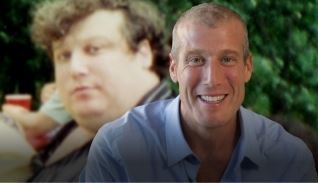Jon Gabriel tipped the scales at more than 400 pounds before a life-changing event motivated him to make different choices. He eventually lost more than 200 pounds with a holistic, diet-free, and stress-free approach.
Omega: You work with many chronic dieters--in fact, you used to be one yourself. How do you help people adjust to the idea of a diet-free lifestyle?
Jon: My story resonates with people because I've been there. I know what it's like to kill yourself to try to lose weight, denying cravings left and right, losing maybe 10 pounds through sheer force -- it's a daily war. Then you have one bad day. You binge and gain that 10 pounds back in a day and another five pounds the week after. I have lived through that.
When I explain the chemistry of what happens to your body from stress, chronic inflammation, or leaky gut, people understand. It makes sense. It's a totally different approach than what people are used to. Everyone is used to the idea of weight loss being a behavior management issue. Every approach out there -- whether you're talking about healing leaky gut, getting rid of candida, being low-carb or paleo or vegan -- takes a behavioral modification approach. It's always about being disciplined on a mental level.
My approach is different. It's about creating certain habits that address the issue so your body wants to be thin. Then it requires no discipline at all. I will go on record saying this, and I've said it many times: Once your body wants to be thin (though it can be easy or hard to get to that point), it is effortless to lose weight.
Omega: How are hormones involved in weight loss?
Jon: The most important hormones when it comes to weight loss are leptin and insulin. It's also not just about the levels of these hormones, it's about how sensitive the cells of your body are to these hormones.
A hormone is a chemical messenger. If you think of your circulatory system as the Internet, a hormone is an email. It's an email that your liver sends to your brain, or your stomach sends to your heart, or your lungs send to your kidneys. The emails go into your circulatory system and then travel.
But imagine the emails aren't getting through. The stomach is sending an email to the brain, but the email is going into the junk folder. It isn't getting opened. That's the problem. Plenty of emails are being sent, but the delivery doesn't happen. We call this resistance. You've probably heard the term "insulin resistance" and maybe "leptin resistance." This means your cells are not responding to those hormones. When that happens, your body goes into a chronic state of fat production.
The hormone leptin is produced by our fat cells. Among other things, it communicates to your brain how fat you are. The more fat you have on your body, the more leptin you produce. If you have a lot of fat on your body, you produce a lot of leptin. It goes through your bloodstream to your brain, and your brain says, "Look at all this leptin. We've got a lot of fat on our body. We need to lose some of this fat."
When your brain registers this, it does all these things to get you to lose weight. You are not hungry; your metabolism speeds up; and you burn fat like a greyhound. You go into this fat-burning mode, and you effortlessly lose weight until your leptin levels go down and your brain says, "We're thin enough."
Omega: What happens when your brain doesn't register fat-regulating hormones like leptin?
Jon: Imagine you have 200 pounds of excess weight on your body, but your brain is not getting any of the leptin signals. Your brain thinks you have zero fat. What would happen? Your brain would say, "We've got no fat on our body. We must keep eating. Give me a pizza. That's gotta work."
That's what it's like when your brain is resistant to this signal. Then, one day, the leptin resistance goes away. Imagine this new scenario. You wake up one morning and your brain goes, "Oh my! We have 200 pounds of excess fat on our body. Where did this come from?" When that happens, all of a sudden you're not hungry.
My approach is to create a system of habits to help address hormonal problems, such as leptin resistance, so that your brain always knows how much weight you have on you. It can realize if you have too much weight and reverse it.
Omega: What causes hormone resistance?
Jon: Processed foods, inflammatory foods like gluten and dairy, grains that elevate your insulin levels, high fructose corn syrup--all of these things cause both insulin and leptin resistance. But there are other things that can cause insulin and leptin resistance, including emotional issues, trauma, stress, and sleep problems. These are just as important, if not more so, than the food. Sometimes you need to start with them first. Once you reverse those things, your body's already going, "Oh, okay, we got too much weight on us," and it's easy to run with the ball. You're not that hungry, so you're not going to want a pizza. The dietary habits become much easier once you address the other issues.
Jon Gabriel is teaching The Gabriel Method™ August 23-28, 2015 at Omega Institute in Rhinebeck, NY.
Explore more in the category of Health & Healing
© 2015 Omega Institute for Holistic Studies, Inc. All rights reserved.
